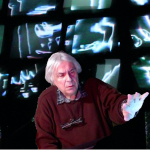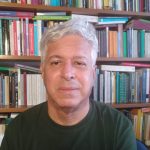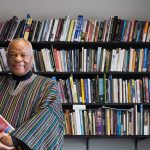KEYNOTE SPEAKERS
Josef Früchtl
Josef Früchtl is a Prof., Dr., born in 1954. Studies of Philosophy, Theory of Literature and Sociology in Frankfurt/M. and Paris; 1985/86 PhD in Frankfurt/M.; 1987-1989 Research Fellowship of the A. v. Humboldt-Stiftung (Pisa/Italy); 1990-1993 Research Fellowship of the Deutsche Forschungsgemeinschaft at the University of Frankfurt/M.; 1995 Habilitation in Frankfurt/M.; 1996 Associate Professor of Philosophy (focused on Aesthetics and Theory of Culture) at the University of Münster; from 2002-2005 President of the Deutsche Gesellschaft für Ästhetik; since 2003 co-editor of the Zeitschrift für Ästhetik und Allgemeine Kunstwissenschaft; 2005, Chair in Philosophy of Art and Culture at the University of Amsterdam; September 2007-2012 & September 2017-2018, Head of the Department of Philosophy; 2020, Emeritus Professor.
Marilena Chauí
Marilena Chauí is PhD in Philosophy and Full Professor at the Department of Philosophy of the University of São Paulo (USP), where she also received the title of Emeritus Professor. She is expert in modern and contemporary philosophy and in political philosophy, having dedicated herself to the works of Spinoza, Merleau-Ponty and issues concerning democracy, critique of ideology and contemporary culture. She coordinates research groups on Spinoza and Contemporary Philosophy. She is a founder member of the Association des Amis de Spinoza (France), the Assoziazone Italiana degli Amici di Spinoza (Italy) and the journal Studia Spinozana (Germany). She earned titles of Doctor Honoris Causa from the Université de Paris VIII and the Universidad Nacional de Córdoba (Argentine). She was awarded the Prêmio Jabuti for her books Cultura e democracia (translated into English with the title Between Conformity and Resistance, published by Palgrave-Macmillan in 2011), Convite à Filosofia (Invitation to Philosophy) e A nervura do real. Imanência e liberdade em Espinosa (The Rib of the Real. Immanency and Freedom in Spinoza — translated into Spanish and published in 2020 by Fondo de Cultura). She was Secretary of Culture of São Paulo City from 1989 to 1992 in the Government of the Workers’ Party (Partido dos Trabalhadores).

Miško Šuvaković
Rodrigo Duarte
Rodrigo Duarte earned his PhD at the University of Kassel (Germany) in 1990 and became professor of the Philosophy Department at the Federal University of Minas Gerais (Belo Horizonte, Brazil) the same year. He was a visiting scholar at the University of California in Berkeley (USA) in 1997, a visiting professor at the Bauhaus Universität Weimar (Germany) in 2000, and a visiting professor at the Hochschule Mannheim (Germany) in 2011. He is the current IAA (International Aesthetics Association) president and presided over the Brazilian Association of Aesthetics (ABRE) from May 2006 to October 2014. In addition to numerous articles and chapters of collective works, in Brazil and abroad, his book publications include (amongst others): Teoria crítica da indústria cultural (Ed. UFMG, 2003), Dizer o que não se deixa dizer. Para uma filosofia da expressão (Ed. Argos, 2008), Deplatzierungen. Aufsätze zur Ästhetik und kritischen Theorie (Max Stein Verlag, 2009, second edition: Springer Verlag, 2017), Pós-história de Vilém Flusser. Gênese-anatomia-desdobramentos (Editora Annablume, 2012) and Varia Aesthetica. Ensaios sobre arte & sociedade (Relicário Edições, 2014).
Molefi Kete Asante
Molefi Kete Asante is Professor in the Department of Africology at Temple University in Philadelphia. He is the President of the Molefi Kete Asante Institute for Afrocentric Studies and Professor Extraordinarius at the University of South Africa. He is the Founding Editor, Journal of Black Studies and first director of UCLA’s Center for Afro-American Studies. Asante has published more than 500 articles and is considered one of the most quoted living African authors as well as one of the most distinguished thinkers in the African world. He has been recognized as one of the 10 most widely cited African scholars. Asante has been recognized as one of the most influential leaders in education. He has been named a HistoryMaker with an interview in the Library of Congress. In 2019 the National Communication Association named him an NCA Distinguished Scholar, its highest honor, saying that his writings were “spectacular and profound”. He received his Ph.D. from the University of California, Los Angeles, at the age of 26, and was appointed a full professor at the age of 30 at the State University of New York at Buffalo. At Temple University he created the first Ph.D. Program in African American Studies in 1988. In 2021 he initiated and conceptualized Temple’s Center for Antiracism Research. He has directed more than 140 Ph.D. dissertations making him the top producer of doctorates among African American scholars. He is the founder of the theory of Afrocentricity, The Cheikh Anta Diop Conference, and the think-tank, The Molefi Kete Asante Institute for Afrocentric Studies in Philadelphia. Asante wrote the mandatory African American History course for Philadelphia School District.

Richard Shusterman

Jacques Poulain
Jacques Poulain is Professor Emeritus at the University of Paris 8 and holder of UNESCO Chair of Philosophy of Culture and Institutions. He was Vice-president of the College International de philosophie (1985-92) after having taught at the University of Montreal (1968-85). His works include: L’âge pragmatique ou l’expérimentation totale (1991), La loi de vérité (1993), De l’homme. Eléments d’anthropobiologie philosophique du langage (2001), Die neue Moderne (2012) and Peut-on guérir de la mondialisation? (2017). He coordinates in collaboration of Bruno Cany the research group of transcultural studies (Université Paris 8 and L’Harmattan).
Tania Rivera
Tania Rivera is a psychoanalyst and essayist who works in a multidisciplinary field of critical reflection regarding the intertwining between subject and culture, moving between psychoanalysis, philosophy, artistic and literary theory as well as practice. Full Professor at the Department of Art at Universidade Federal Fluminense (UFF), holds a Master’s and a PhD in Psychology from Université Catholique de Louvain, Belgium (1996). Worked as a visiting professor at the Department of Plastic Arts at Université Paris 8, Vincennes Saint-Denis, in 2016. Author of several books such as Arte e psicanálise (2002), Imagem, cinema e psicanálise (2008), Hélio Oiticica e a arquitetura do sujeito (2012) and Psicanálise antropofágica. Identidade, gênero, arte (2020). Received the Jabuti Prize in the category Psychology/Psychoanalysis (2014) for the book O Avesso do Imaginário, Arte Contemporânea e Psicanálise (The Reverse of Imaginary, Contemporary Art and Psychoanalysis, Cosac Naify, 2013). Has also worked as art curator of the exhibition Lugares do Delírio (Places of Delirium, Rio Art Museum, 2017 and Sesc Pompeia, 2018), among others.

Fiona Hughes
Fiona Hughes is Senior Lecturer in Philosophy in the School of Philosophy and Art History at the University of Essex, U.K.. Her research is principally directed to Kant’s epistemology and aesthetics; phenomenology (especially Merleau-Ponty); the philosophy of the arts and, most recently, constructing dialogues between philosophy and archaeology. She is the author of Kant’s Aesthetic Epistemology: Form and World (Edinburgh University Press, 2007) and Reader’s Guide to Kant’s Critique of Aesthetic Judgement (Continuum, 2010). Other publications include: ‘Relief and the Structure of Intentions in Late Palaeolithic Cave Art’ The Journal of Aesthetics and Art Criticism 2021; ‘The Temporality of Contemporaneity and Contemporary Art: Kant, Kentridge and Cave Art as Elective Contemporaries’ Kantian Review 2021; ‘The playful negotiation of interests: Kant in conversation with Fried and Winnicott’ in Disinterested Pleasure and Beauty: Perspectives from Kantian and Contemporary Philosophy ed. L. Berger, Berlin: de Gruyter (forthcoming); ‘A Passivity Prior to Passive and Active: Merleau-Ponty’s Re-reading of the Freudian Unconscious and Looking at Lascaux’ Mind 2013; ‘Style in Communication’ in Style in Theory/ Styling Theory ed. I. Callus, J. Corby, G. Lauri-Lucente (Continuum, London & New York) 2013 on Hélio Oiticica.






